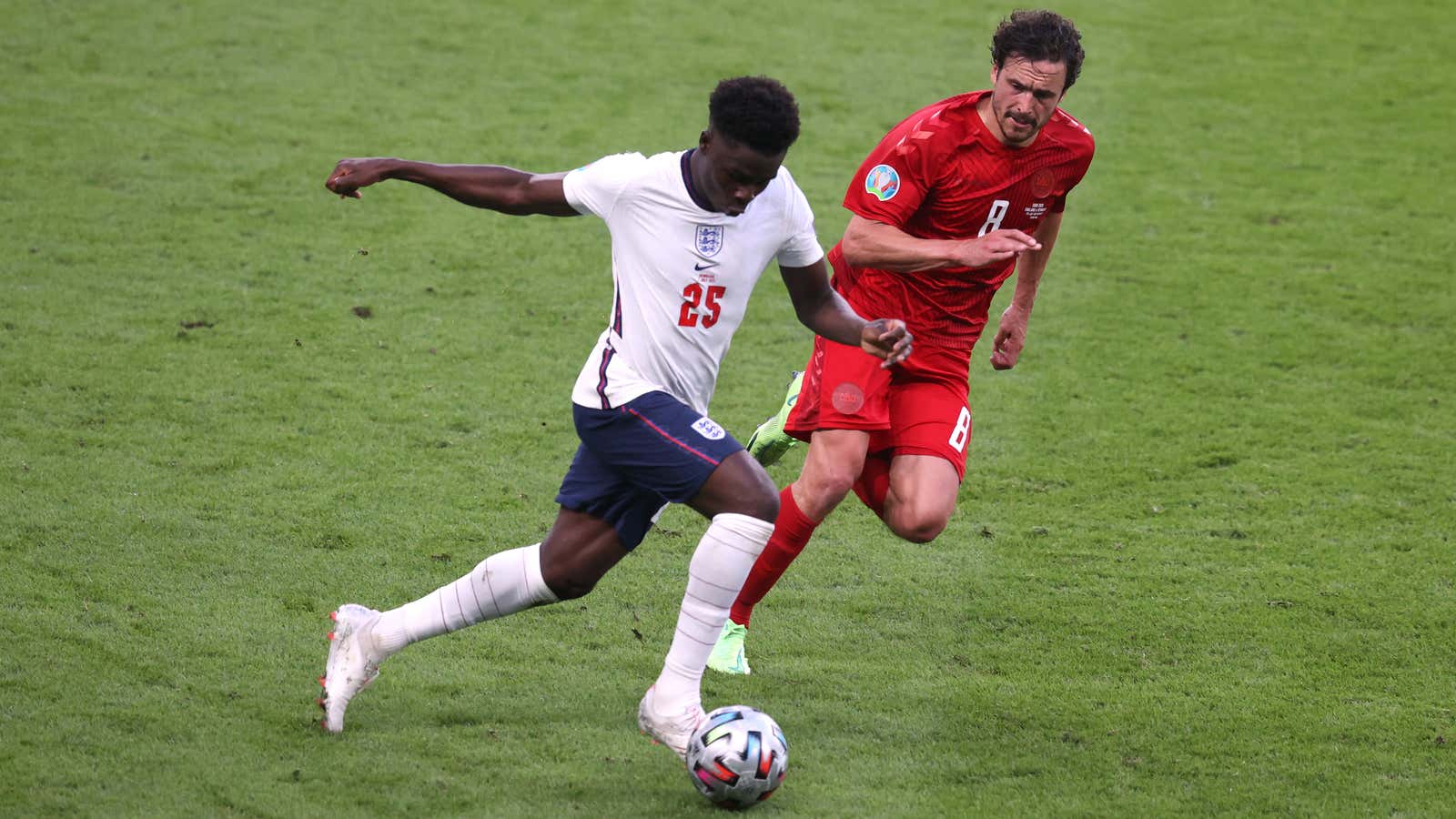Bukayo Saka was one of the breakout stars of the European soccer championships. Although he wears an England jersey, he is also increasingly popular in Nigeria. But devastatingly, he missed the crucial penalty kick to lose the final, and hand the trophy to Italy—for this, he has faced racial abuse on social media.
The 19-year-old’s exciting, efficient performances were crucial in the Three Lions’ unprecedented journey to the final. A photo of him grinning on an inflatable unicorn in the pool became the stuff of internet memes, and his teammates speak highly of his personality and influence. He was also an A-grade student at school.
Saka was born and raised in west London to Nigerian parents. He played for England in various age groups, but naturally, his talent also caught the attention of Nigerian fans and soccer administrators. It didn’t hurt that he was playing for Arsenal, a club that already has a strong Nigerian following because of the legendary Nwankwo Kanu. Many dreamed of Saka one day donning Nigeria’s white and green.
But it was not to be. In what was dubbed “Independence Day heartbreak”, the versatile attacker announced his decision to represent England on October 1, 2020 — the 60th anniversary of the West African nation’s independence from Great Britain. There was a mixed reaction. Some wondered what could have been if he’d chosen Nigeria; others hailed him for picking a country that offers greater stability than Nigeria’s uncertain soccer environment.
Europe’s African-origin superstars
Given the diversity of its major cities and the number of immigrants that settle in the UK, England has numerous young players, many of African origin, who could play for more than one country. This also applies to many other European countries, where some of the best French, Portuguese, and even German players have roots in Africa.
The Chelsea duo of Tammy Abraham and Fikayo Tomori had already joined the list of players that could have chosen Nigeria over their birthplace, England. Nigeria’s soccer boss, Amaju Pinnick, who had developed a penchant for hunting dual-nationality players across Europe, failed in his overtures to Abraham, with his methods drawing criticism from the media.
Where it failed with Saka, Abraham, and Tomori, Nigeria has succeeded in luring other dual-national Londoners: Alex Iwobi and Victor Moses have made the switch in recent years.
Dual-national players who choose Nigeria either claim a strong Nigerian connection, or hint at the Super Eagles being their second choice. It’s a tricky dilemma, because family roots can be a powerful force. But unfortunately, Nigeria’s soccer development is miles away from England’s, and its national team isn’t the catch it once was; a third-place finish at the last African championship is an isolated bright spot.
Nigerian or English? Both, actually
Identity is a tricky thing. Though he has Nigerian parents and was no doubt raised in a household with strong influences from their home country, Saka is also English through and through, having grown up in London. He has never even visited Nigeria.
“I feel like I’m really, really proud of my Nigerian heritage,” Saka said when he chose England. “I always still watch Nigeria’s games where I can, and I wish them all the best and support them all the way.
“But I’ve seen the process of how England is transforming and I think in the future they’re going to do great stuff. I feel like it was right for me to choose England.”
Nigerian media outlets covered Saka’s feats, and the fans reveled in the fact that a young Nigerian ran the best defenders in the world ragged, doing so much to help England nearly win its first European trophy. It is something they can identify with, but with a tinge of regret.
This piece was updated to reflect the result of the game between England and Italy.
